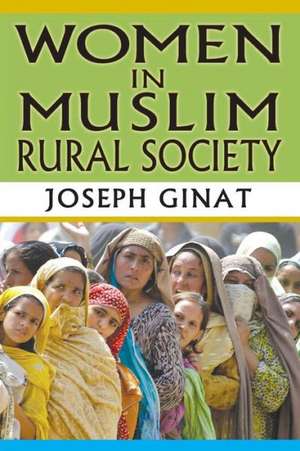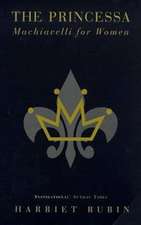Women in Muslim Rural Society
Autor Joseph Ginaten Limba Engleză Paperback – 30 mai 2013
Ginat's analysis of marriage patterns dispels the common notion that men customarily seek the hand of their father's brother's daughter, and that this type of marriage illustrates a principle of endogamy in Arab village society. After carefully examining the numerous reasons for each marriage, he concludes that a combination of material and political considerations of the families involved, and not stated norms, determines the choice of spouses.
The author clarifies the notion of honor, which hitherto has been used to explain so many things in Arab society. In Arab societies a man's honor often seems to depend on the reputation of his women. Now it appears that his honor is gauged not by the actual sexual comportment of women for whom he is morally responsible, but by public attitudes towards that sexuality. Ginat's analysis adds to our understanding of some central themes in Arab society. He provides valuable and complete information about aspects of family life that have rarely been covered in such detail.
Preț: 197.22 lei
Nou
Puncte Express: 296
Preț estimativ în valută:
37.74€ • 41.12$ • 31.80£
37.74€ • 41.12$ • 31.80£
Carte tipărită la comandă
Livrare economică 23 aprilie-07 mai
Preluare comenzi: 021 569.72.76
Specificații
ISBN-13: 9781412851763
ISBN-10: 1412851769
Pagini: 289
Dimensiuni: 152 x 229 x 15 mm
Greutate: 0.43 kg
Ediția:1
Editura: Taylor & Francis
Colecția Routledge
Locul publicării:Oxford, United Kingdom
ISBN-10: 1412851769
Pagini: 289
Dimensiuni: 152 x 229 x 15 mm
Greutate: 0.43 kg
Ediția:1
Editura: Taylor & Francis
Colecția Routledge
Locul publicării:Oxford, United Kingdom
Cuprins
List of Figures and Tables Foreword Preface Acknowledgments Chapter 1: General Features of the Hamlets The Villages Choice of Research Location Research Methods Ecology of the Hamlets Public Buildings and Shops Private Homes and Courtyards Personal Clothing Notes Chapter 2: Historical Background and Environment Establishment of Offshoots Different Types of Dwelling Situation after Rhodes Agreement Land Ownership Housing Projects and New Buildings Local Government and Institutions Education Transportation and Communications Contacts Between Hamlets Notes Chapter 3: Economic Structure Occupation Histadrut Membership Land Leases Distribution of Irrigation Water Water Cooperatives Livestock Occupational Changes and Attitude to Village Notes Chapter 4: Marriage Patterns Alleged Right to Marry FBD Explanations for Alleged FBD Preference Proposed Evaluation of Marriage Patterns The Model Marriage Patterns in the Hamlets Sub-period 1918-30 Sub-period 193 1-48 Sub-period 1949-56 Sub-period 1957-June 1967 Sub-period July 1967-Sept. 1974 Exchange Marriages - Badal FBD Marriages: Fact Versus Ideology Descent and Hamfila Membership Planned Marriages Further Discussion of Badal Endogamy Reconsidered Summing up of Method, Model and Marriage Patterns Notes Chapter 5: Woman's Status and Role Woman's Power Ideology Versus Woman's Own Views Average Size of Family Freedom of Movement Changes in Woman's Status Woman's Involvement in Decision-Making Selection of Marriage Partners Woman as Property Owner Family Honor and Shame Relationships within the Family Women as Conveyors of Information Importance of Gossip Roles in Circumcision Ceremonies Woman's Place in the Political Structure Woman's Definition of her Role and Status Notes Epilogue Appendixes: Appendix A: Informant Questionnaire Appendix B: Supplementary Agricultural Data Appendix C: Kinship Charts Appendix D: Supplementary Studies in Marriage Pattern Analysis Photographs Bibliography Index
Descriere
This study reassesses several accepted truths about Arab village society














